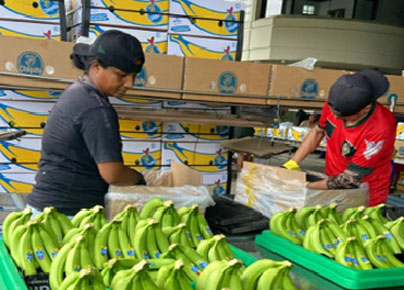Ecuadorian Banana Growers Advocate for Fair Prices at World Forum in Rome
2024-03-08

Facing pressure from European clients, particularly supermarket chains demanding lower prices, the Ecuadorian banana sector is striving to highlight the efforts made by stakeholders in the supply chain. For instance, they ensure a living wage is paid. The industry urges Europeans to adopt a Fairtrade methodology (Fairtrade) and pay a fair price for their bananas. This year's Minimum Supporting Price (MSP) is set at $6.85 for the box of about 18.50 kg for the fruit only, to be paid to growers, marking an increase of $0.35 per box compared to the 2023 price. The European Union is the primary destination for Ecuadorian bananas, absorbing 29.93% of the 32.41 million boxes exported to all destinations in January. However, according to Jose Antonio Hidalgo, Executive Director of the Association of Banana Exporters of Ecuador (Aebe), only two supermarket chains operate under the Fairtrade methodology. Hidalgo emphasizes the need for other supermarkets to align with this methodology for fair pricing.
The banana industry is caught between the struggle for a fair price in Europe and a decline in production due to a lack of farm investment. The upcoming Fourth Global Conference of the World Banana Forum, held from March 11 to 14 in Rome, Italy, presents an opportunity to address these issues. The Ecuadorian delegation will attend under the Ecuadorian Banana Cluster and present three critical points at the event. The first point is to encourage other supermarkets to use the Fairtrade methodology as a reference for their pricing. The second point, as explained by Hidalgo, is to acknowledge that there are two ways to achieve a living wage: through state policies, as implemented by Ecuador, and through collective bargaining. Hidalgo highlights that Ecuador complies with the living wage through its national wage policy, robust labour law, and socialization spaces through the Labor Committee.
Hidalgo also proposes creating a technical subcommittee to rationalize certifications. He cites that the Global Living Wage Coalition determined that Ecuador had to comply with $489 in 2023. However, the actual amount received by the worker, including basic salary, fourteenth, thirteenth, and reserve funds, was $562.5. This achievement positions Ecuador as a model for other banana-producing countries. The final point addresses the issue of over-certification in the European market due to various schemes around banana imports. This results in more auditing days and increases the administrative burden for producers. Hidalgo reveals that all these required European schemes have a 60% overlap. The sector will recommend a rationalization process in Rome to reduce audit days and the burden on producers. It will be achieved by creating a technical subcommittee of the World Banana Forum under the FAO, where certifiers are committed to working on this process.
In the lead-up to the forum in Rome, the banana sector has launched a social media campaign addressing these issues and requests. The Ecuador Banana Cluster posted on its X (formerly Twitter) account, "Will the burden of excessive certifications continue on Latin American producers? From March 11-14, during the Fourth Global Conference of the World Banana Forum, we expect action!"









